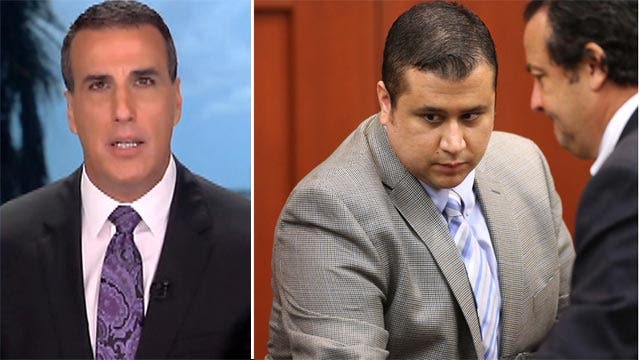George Zimmerman jury selection a 'recipe for disaster'?
Judge Alex reacts to selection process, upcoming trial
After a week and a half of grilling potential jurors individually, attorneys have chosen 40 jury candidates to return for the second round of questioning in the George Zimmerman trial.
The potential jurors will now be questioned as a group on an array of different topics as attorneys seek to whittle down the group of 40 to just six jurors and four alternates who will decide the fate of the Florida neighborhood watch captain charged with second-degree murder in the fatal shooting of 17-year-old Trayvon Martin.
SPECIAL COVERAGE: ZIMMERMAN TRIAL
Twenty-seven of the 40 potential jurors are white, seven are black, three are mixed race and three are Hispanic. The pool also is overwhelmingly female and skews middle-aged.
The racial and ethnic makeup of potential jurors is relevant, prosecutors say. They have argued that Zimmerman racially profiled Trayvon Martin when he followed the black teen last year as Martin was walking back from a convenience store to the home of his father's fiancee.
Zimmerman, who identifies himself as Hispanic, fatally shot Martin a short time later following a confrontation that was partially captured on a 911 call.
The case has gained national attention, and, during the first round of jury selection, potential jurors were questioned at length about their knowledge of the case.
"I haven't lived under a rock for the past year," said Juror B-51. "It's pretty hard for people not to have gotten some information."
Juror B-51, a white female retiree, was quizzed on the second day of jury selection. She said her first impression of the case was "sad" for both sides. When asked if she thought Zimmerman had done anything wrong by getting out of his truck, she said, "Certainly, he didn't wait. Maybe the police didn't come quick enough. I don't know."
The 44-day delay in Zimmerman’s arrest prompted protests nationwide. One juror, Juror B-35, described the protests as “saber-rattling.”
"I think they politicized it and made it a racial issue, and I didn't like that," said Juror B-35. "I wasn't agreeing with the racial connotation."
Juror B-35, a middle-aged black man who owns vending machines, also wondered why there weren't protests over the fatal shootings of other African-American men in Sanford, the Orlando suburb where Martin was killed in February 2012. He also said he believed Zimmerman deserved his day in court.
Juror H-7, who was described as a white male in his late 50s or early 60s, said he thought the case was a "nuisance" that was "disrupting typical events in the area."
"I still don't understand why it's a high-profile case," he said while he was being quizzed on Monday.
Juror B-7, a middle-aged white man, said he didn't think Florida's stand-your-ground law was necessary in the state given other self-defense laws that were in place prior to its passage. The law allows a person to invoke self-defense if they feel a fatal shooting is necessary to prevent death or great bodily harm.
Zimmerman is claiming self-defense. He has pleaded not guilty to second-degree murder.
Juror B-7 also said he thought news media coverage of the case had been "speculative" and devoid of hard facts.
Media coverage of the case took center stage during jury selection as attorneys grilled potential jurors about which news outlets they watched and if they thought coverage of the fatal shooting had been biased.
Potential juror E-13, a white female in her 20s, said, "I never really watch the news," while potential juror E-28, a married white female in her late 50s or early 60s, said she listens to a lot of radio on her 15-minute commute to her job as a nurse.
“I know that the media is not always accurate,” said one potential juror known as Juror H-69, a pregnant woman in her late 20s. “My sense is that they are trying to get the news out … it would be impossible for them to have all the information that happened.”
Judge Debra Nelson has ruled that jurors will be sequestered during the trial, which is expected to last two to four weeks.
Juror H-18, described as an Hispanic male in his 30s who co-owns a business, said being on the jury could be a hardship for his co-owner.
Juror K-80, a white female and married mother said her “biggest fear is sequestering.”
Juror P-67, a Hispanic male, born in Mexico but naturalized in the U.S., said that he wanted to be a juror to pay back his country and because it is part of his citizenship.
Overall, the potential jurors had mixed feelings about the case, but many agreed it will be difficult to make a decision in the case due to its tragic nature.
“This is a tragic case,” said Juror H-29, a white male in his late 50s.
Juror I-24, a white female, shared the same sentiment.
“A young man has lost his life, another man is fighting for his,” said Juror I-24. “No one is a winner in this case.”
The Associated Press contributed to this report.






















